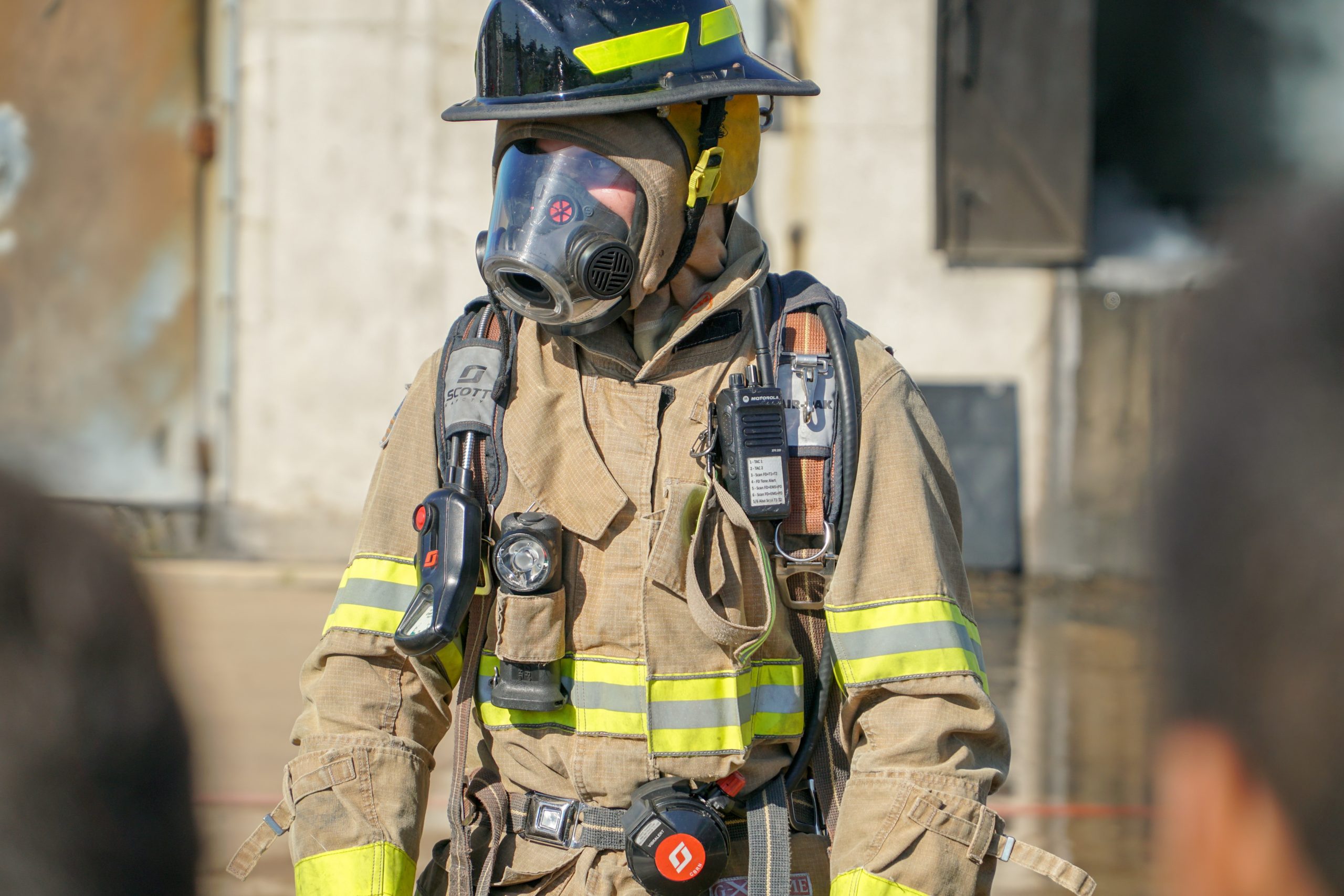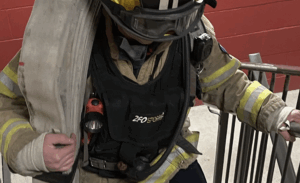Table of Contents
Firefighter Hiring Requirements and Preferences Explained
In this article, we’ll cover common fire department hiring requirements and preferences
Why are they important?
You must meet all the requirements to apply for a firefighting position.
Preferences are a great way to move yourself up the candidate list.
Learn how to Take Advantage of Firefighter Hiring Requirements, Preferences, and Certifications.
Firefighter Hiring Requirements
Firefighter hiring requirements are the minimum things must you have to qualify as a primary candidate? All departments will have hiring requirements. Meeting a department’s needs is your first step toward becoming a viable candidate.

Firefighter Hiring Preferences
These desirable attributes give you an advantage over other candidates – for which you might get extra “bonus” points or move to the top of the list during the hiring process.

While not all fire departments have established hiring preferences, for those that do, a qualifying candidate with preference points can significantly enhance their advantage over minimally qualified applicants.
Firefighter Hiring Requirements
Each city fire department has basic firefighter hiring requirements for potential candidates. These are non-negotiable and typically include:
18 years of age
Valid driver’s license
High school diploma or equivalent
Clean criminal record
There may be additional firefighter hiring requirements including
Residency
Some city departments require candidates to live in or move into the city once hired. These “residency requirements” have been imposed on firefighters in certain jurisdictions and upheld in federal courts – as long as the employing jurisdiction has demonstrated some “rational” basis for the provision.
EMT
A recent trend in the fire service is to require firefighter candidates to possess an emergency medical technician (EMT) certification. This could be a State or National Registry of EMT-Basic certification. Depending on the fire department, it could be required at the time of application or before the date of actual employment.
CPAT
Another common trend for some city departments is to require candidates to pass and hold a current CPAT (Candidate Physical Ability Test) certification. The CPAT is a standardized test NOT usually administered by or affiliated with the fire department, and the candidate typically pays the costs. CPAT certifications expire within 1-year and current certificates are required on your hiring date. Look for more on the CPAT in the physical ability test chapter.
Firefighter I and II
A common occurrence with smaller fire departments is requiring a Firefighter I & II certification, which measures the knowledge and skills you’ll need.
- The Firefighter 1 Certificate covers basic fire service qualifications.
- The Firefighter 2 Certificate involves more specialized areas and command.
Most big fire departments offer this education, training, and certification through their recruit academy and journeyman program. Please be sure to look for details when researching your target fire department. If you want to learn more about continuing you firefighter or EMT education read: Firefighter Job: Advancing Your Education to Secure Your Dream Firefighter Job.
Firefighter Hiring Preferences
Firefighter hiring preferences could be one of the most important sections in the guide. Hiring intentions are a critical but often unknown factor in the hiring process.
Preference points could be the most significant factor in your success. Not every Department offers preferences to qualifying candidates. But if the Department does provide preference points, those candidates who don’t meet any of the selections are often left at the bottom of the candidate list.
Find out if hiring preference points are available – and use them to your advantage.
Bonus preference points are awarded to the candidate’s score at the end of the testing process, moving them to the top of the eligibility list.
Firefighter hiring preferences are commonly awarded for:
Residency
Military Experience / Veteran
Firefighter
EMT / Paramedic
City Employee
Post-High School Education
Other preferences may be available – check with the Department. Read on to learn more about the more common preferences.
You’ll be asked…
The hiring authority will typically ask if you qualify for any preferences on the application form. If you do, answer “yes” then and be ready to include the proper documentation to receive credit for it.
Some departments will allow a candidate that becomes eligible for a preference award at a later date (i.e.military) to update their application then.
Tip:
When researching, determine what documentation is required to prove your eligibility for the preference. Have that documentation available during the application phase.
Even if you qualify for preference points, you will still have to meet all the minimum requirements and participate in all the assessment process steps.

Preferences Matter – Two Stories
When I applied, I scored 97.5% on the written test and 97.5% on the physical (averaging 97.5%). I also received five additional points for residency. My final score was 102.5%, and I ranked 26 out of 3,550 candidates. I was offered a job in the force relatively soon after applying.
However, a friend had no preference points to help raise his final rank. He scored 100% on the written exam and 100% on the physical test and was the top candidate – but he didn’t qualify for any bonus points. As a result, he was lower on the list and wasn’t offered a job until a later hiring round two years later. He would have been hired much sooner if he had any preferences.
Common Firefighter Hiring Preferences
Residency
Does the fire department offer hiring preference to residents? Maybe.
In recent years, many departments have moved away from the residency requirement after legal challenges in the courts. However, some fire departments may still give preference to those candidates who live within city limits – awarding them residency preference points to their score.
- Why do city, fire department, and union authorities want firefighters to live in the community?
- Cities like to employ people who are also taxpaying community members – their residents.
- Resident firefighters are more likely to represent the diversity of the citizens in the community.
- Fire departments know it’s nice to have firefighters who live close to work, providing a ready pool of help during emergencies.
- Union officers like resident firefighters because it has a more significant grassroots voting bloc to help leverage firefighter agendas within the city’s political framework.

Residency Requirements
Most departments that offer residency preference points require applicants to be residents of the city for a certain length of time. Sometimes, it may be one year before the application deadline. Candidates are required to submit:
- A copy of their driver’s license showing their current address.
- At least three (3) forms of irrefutable evidence to substantiate the claim of residency.
During the background investigation, investigators may dig deeper to substantiate your claim of residency. Candidates who attempt to “fake” their residency to receive extra points will be discovered and disqualified for lying on the application.
How Residency Points Work
If the Department gives residency preference points to a candidate living in the city, it might look like this:
- Your average score after the written and physical performance test was 97%.
- You live in the town and therefore qualify for ten residency points.
- Your final score on the candidate list is 107%.
Living in the community might make a difference – moving you to the top of the candidate list.
Veteran
Does the fire department offer military veteran preference?
Many state and local authorities recognize a military member’s service to the country by awarding veteran preference points or moving the veteran candidate to the top. The city’s Department of human resources commonly adds up to 10 percentage points to a passing final score (the combination of the candidate’s written and physical performance test score).
Having a military career will not get you a job as a firefighter but your military service can enhance your path and increase your chances.
Why do fire departments value military service?
- The military offers fire service-related training such as firefighting, medic and hazardous materials – which looks great on a resume.
- The fire service itself is run and operated as a paramilitary organization. Military veterans demonstrate respect for authority and understand the chain of command.
- Veterans are cast into situations that force them to mature young and know how to work with people from diverse backgrounds.
- Veterans understand the value of training, physical fitness and healthy eating.

Veteran Status Requirements
- Use caution. Refrain from assuming that if you served in the armed forces, you automatically get preference points for becoming a firefighter.
- Preferences may vary from state to state – and city to city.
- Not all jurisdictions recognize veteran status in the same way.
- Some may grant you veteran status simply because you served in the military.
- Others will consider your length of service, overseas deployment, and discharge status.
You can qualify for both veteran and residency points. If you have been deployed or are on the move, your home address in the U.S. is still your official residency address. For example, if you were deployed to Baghdad – your home address isn’t Baghdad. It’s the city you live in stateside. Make sure to clarify this with the city’s Department of Human Resources.
Ask these questions
- Does the Fire Department offer preference points for veterans?
- Which service type? (Army, Navy, Air Force, Marine, National Guard…)
- Does discharge status matter?
- What documentation do you need to substantiate your service?
Current Firefighter
Are you already a volunteer or professional firefighter?
Many metropolitan fire departments recognize the value of hiring a fully trained and vetted firefighter.
- It saves the city on training and educating a new firefighter.
- The experience, training, and skills you already have are essential to your overall success.
- Having firefighter experience conveys a serious career interest to the chief hiring officer during the oral interview.
- Most firefighters are EMT or paramedic certified.
- Most firefighters are Firefighter I & II certified.
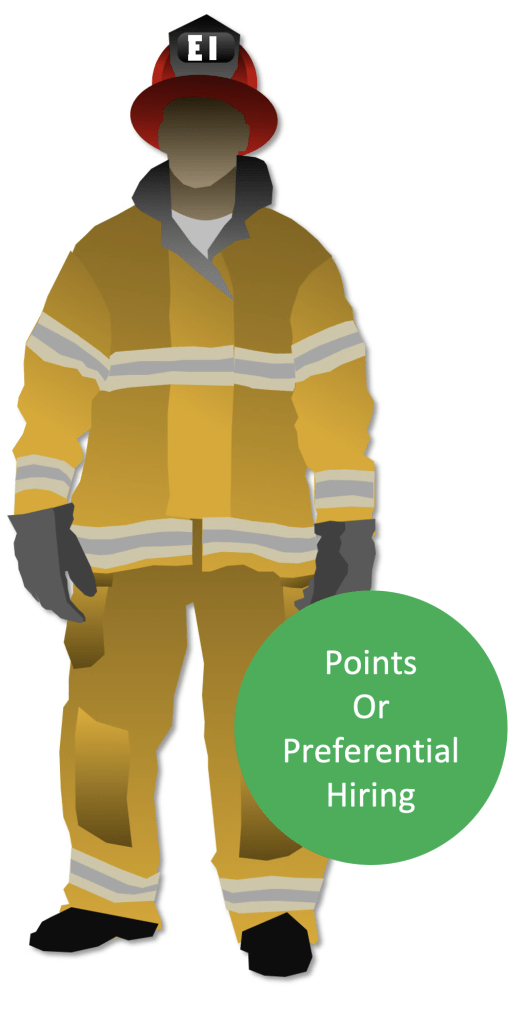
As a result, some jurisdictions award preference points to candidates who are already employed by a fire department (as a career or as a volunteer) and meet the required level of certification they’re looking for (usually Firefighter I and II training with an EMT-Basic or paramedic certification).
Some fire departments may even allow applicants with previous firefighting experience to transfer seniority credits or pension plans from one job to another.
Volunteer Firefighters May Get Free Training
Many volunteer fire departments choose to send their cadets to school to get the Firefighter I and II certifications. If you’re a volunteer firefighter, this is a great way to get an education for free and gain firefighter experience simultaneously. To learn more about volunteer firefighting, go to Learn How to Become a Volunteer Firefighter.
Firefighter I & II courses typically take around 150 hours to complete. Please contact your local community college for details, availability, and cost. If you want to learn more about continuing your firefighter education, read: Firefighter Job: Advancing Your Education to Secure Your Dream Firefighter Job.

Current City Employee
Does the city employ you in a different industry?
Some jurisdictions allow preferential hiring for firefighter candidates already employed by the city in another capacity. Candidates have been awarded preferential hiring after employment as police officers, dispatchers, public safety officers, garage mechanics, fire prevention and inspectors, public works, parks and recreation workers.
If you are a current city employee, find out if this preference is available and if you meet the requirements. Usually, city employees are placed at the top of an eligibility list or given bonus points at the end of the exam process.
Suppose you are not a city employee; your dream fire department offers this preference. In that case, consider working for the city in another capacity to make yourself eligible for the preference.
Some departments may even allow the successful applicant to transfer seniority credits or pension plans from one job to another.
EMT or Paramedic
Are you already an EMT or paramedic?
Metropolitan fire departments love candidates who are already an emergency medical technician (EMT) or a paramedic – and some may offer preference points to those with the training. Why?
- Many calls firefighters respond to involve medical emergencies, so firefighters with EMT certifications are highly valued.
- Sending firefighters to paramedic schools can cause budgetary and staffing strains on an extensive city department. Hence, a certified firefighter candidate with an EMT or paramedic license is a great economical solution.

Most volunteer fire departments will help train and certify their personnel (i.e., EMTs), providing an excellent opportunity for experience and, potentially, a free education.
You can also take an EMT or paramedic course through a local community college and make yourself more eligible.
EMT/Paramedic Training
An EMT Basic course is typically between 120-150 hours and can be completed in a semester; paramedic school can take over a year. Please reach out to your local community college for details and costs. If you want to learn more about continuing your firefighter or EMT education, read: Firefighter Job: Advancing Your Education to Secure Your Dream Firefighter Job.

Post High School Education
Do you have a 2-year or 4-year degree in a fire service related field?
Less prevalently, some jurisdictions offer associate’s or bachelor’s degree candidates preference points.
Candidates have been awarded preferential hiring points after completing a degree in various programs, including emergency services and non-emergency services-related programs.
If you have an associate’s or bachelor’s degree, determine if this preference is available and if you meet the requirements. Sometimes, college graduates are placed at the top of an eligibility list or given bonus points at the end of the exam process.
Suppose you do not have a post-high school education, and your dream fire department offers a hiring preference. In that case, consider a degree program to make yourself eligible for the preference.
Remember, some fire departments require Firefighter 1 and 2 as well as EMT.
Take Advantage of Firefighter Requirements, Preferences and Certifications
If you meet the firefighter hiring requirements, qualify for a preference, or have any certifications, get credit for them. You MUST report your qualification at the right time in the process – and have the proper documentation. This is crucial.
- The hiring authority actively seeks ways to eliminate candidates from their long lists. Take your time here.
- Follow instructions accurately to avoid missing out.
- If you make any mistakes when reporting, you cannot go back and “fix it.” Your preference points will not be applied retroactively.
Try Taking The Firefighter Test Today!
Summary
Researching the fire department’s firefighter hiring requirements, preferences, and policies is up to you. If you have not done your homework and don’t thoroughly understand all the facts, you are at risk of:
- Being eliminated for missing a deadline or waiting for the next application phase a year or two away.
- Lagging at the bottom of the candidate list because you needed help understanding or reporting preferences.
Key Takeaways
All fire departments have different firefighter hiring requirements and preferences.
Firefighter Hiring Requirements
You must meet all the requirements to apply for a firefighting position. Requirements may include:
- Age, driver’s license, high school diploma, clean criminal record, residency
- Certifications such as EMT, Paramedic, CPAT, Firefighter I and II
- Check with the department
Firefighter Hiring Preferences
Firefighter hiring references are a great way to move yourself up the candidate list. Find out if the fire department recognizes any preferences. If you qualify, collect the proof and be ready to provide it at the time of application. Potential preferences could include:
- Residency
- Military Experience / Veteran
- Firefighter
- EMT / Paramedic
- City Employee
- Post-High School Education
If you don’t qualify for any requirements or preferences, consider taking classes to earn certifications. Doing so will make you a more valuable candidate and may move you up the candidate list.
Helpful Tools for Your Research
Here you’ll find relevant Prep Worksheets for you to use to research different fire department(s) and list there firefighter hiring requirements and preferences. The Data Collection Worksheet will prompt you to ask pertinent questions relevant to the assessment process. The intelligence you gather will help you develop an informed strategic plan.
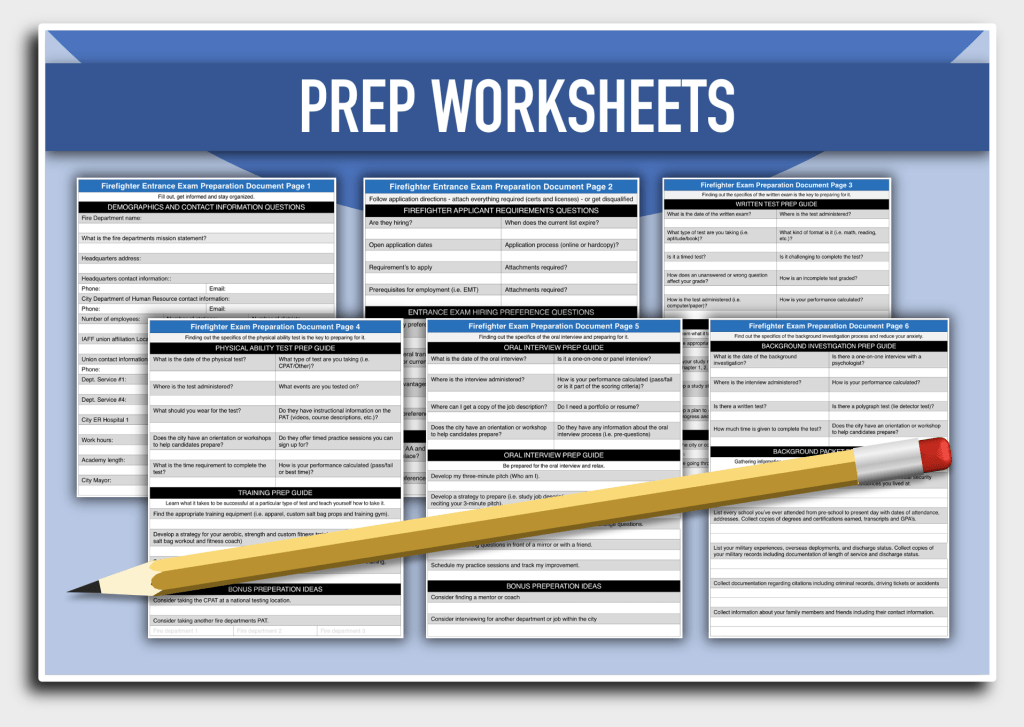
Complete the six worksheets for each department as part of your prep work. You may think this prep work isn’t important now, however, when you are sitting in an interview before a panel, you’ll be asked some difficult questions. You’ll be glad you did your research.
Learn How You Can Become A Firefighter
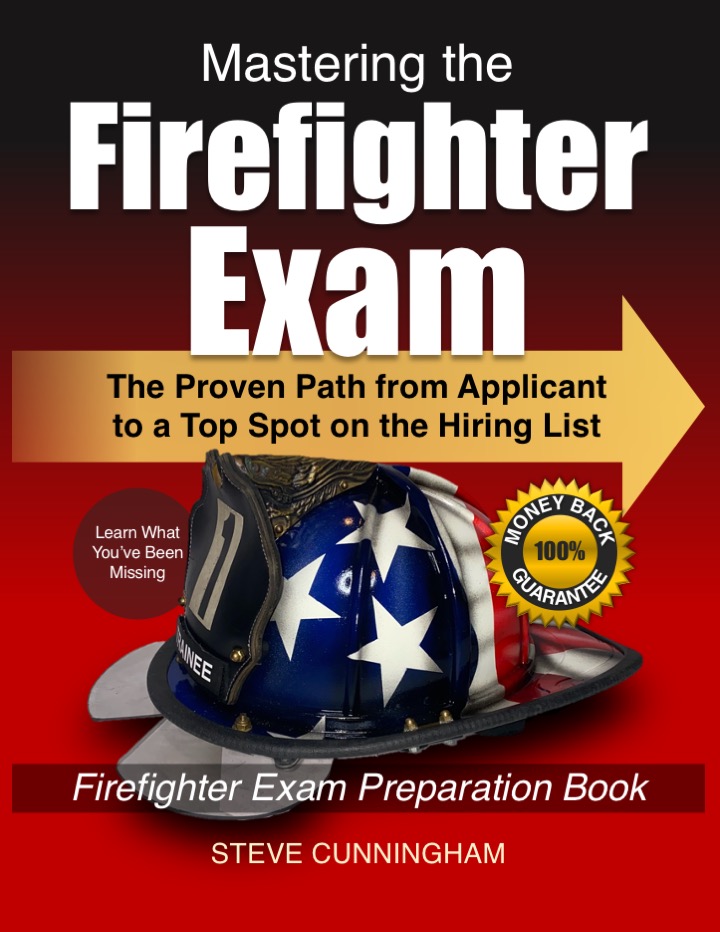
Mastering the Firefighter Exam is a complete guide on how to pass the firefighter exam with a top score. It simplifies the complicated hiring practices of big city fire departments and reveals insider information most candidates don’t know about.
If You Would Like To Know How To Get A Head Of Your Competition, This Book Is For You.

